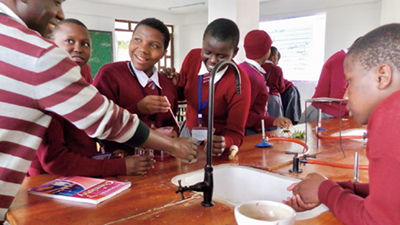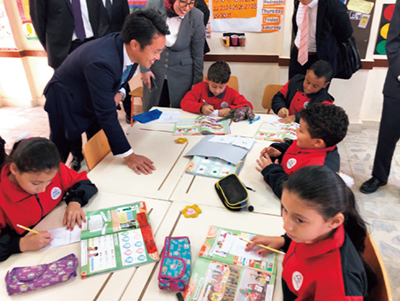(3) Quality Education for All
Education is a basic human right that should be enjoyed by all people equally, and plays an important role in the socio-economic development that is needed for poverty reduction. At the same time, it also enables individuals to develop their potential and capability, as well as to live with dignity. It is also said that education forms the foundation for peace through fostering understanding of other people and different cultures. However, there are still approximately 64 million children who cannot go to elementary school worldwide(Note29). When including secondary school, there are around 262 million out-of-school children according to the 2017 statistics. In particular, the percentage of children who cannot go to school has been increasing since 2000 in Sub-Saharan Africa. Furthermore, as the World Bank points out in the World Development Report (2018), the learning crisis has also become a major problem, in which even the children who go to school cannot perform basic reading, writing, and arithmetic skills. It is necessary to provide opportunities for education and vocational training to young people that respond to social changes and technological innovation, and foster human resources who can create innovation toward resolving global issues.
In order to improve this situation, Goal 4 of the SDGs has been set up as “Ensure inclusive and equitable quality education and promote lifelong learning opportunities for all.” The international community formulated the “Education 2030 Framework for Action”* in 2015, with the aim of achieving this goal.
In 2019, Japan compiled the G20 Initiative on Human Capital Investment for Sustainable Development: Quality Education to Create an Inclusive, Resilient, and Innovative Society, as the G20 Presidency. The G20 Osaka Leaders’ Declaration reaffirms the commitment to promote quality education that is inclusive and fair for all people through human capital investment. In addition, in his speech to the General Debate of the 74th session of the United Nations General Assembly in September 2019, Prime Minister Abe mentioned the promotion of inclusive, quality education for all girls and women, and emphasized that “the essence of Japan’s international engagement can be found in the fact that we earnestly value education.”
●Japan’s Efforts

Tanzanian female junior high school students attending a science class through the “Project for Establishing a Model School to Produce Women Leaders through Enhancement of Science and Mathematics and All-round Education” (Photo: JICA)

Parliamentary Vice-Minister for Foreign Affairs NAKATANI Shinichi visiting an Egypt-Japan school in Cairo (December 2019)
Japan has traditionally placed importance on assistance in the field of education as an essential area for promoting human security, and has been providing developing countries with a broad range of support, including the enhancement of basic education*, higher education, and vocational training. Coinciding with the UN Summit for the adoption of the 2030 Agenda for Sustainable Development in 2015, Japan announced a new education cooperation strategy entitled “Learning Strategy for Peace and Growth.” This strategy aims to achieve quality education through mutual learning, under the following basic principles: (i) education cooperation to achieve inclusive and equitable quality learning, (ii) education cooperation for industrial, science and technology human resources development and building the foundation of socio-economic development, and (iii) establishment and expansion of global and regional networks for education cooperation.
During the 7th meeting of the SDGs Promotion Headquarters held on June 21, 2019, the Expanded SDGs Action Plan 2019 was decided. As one of the G20 Presidency’s initiative, Japan announced its “Education x Innovation” initiative to support at least approximately nine million children and young people during the three-year period between 2019-2021. In order to allow all children to complete quality primary and secondary education by 2030, it is essential to encourage innovation to accelerate assistance. Through this initiative, Japan will further strengthen support for education that fosters basic knowledge, STEM education(Note30), development of e-learning, and more (see also “Master Techniques from Japan to the World”).
At TICAD7 in August 2019, Japan announced its intention to provide quality education to three million children through measures such as science and mathematics education and improvement of the learning environment, as well as develop 5,000 highly-skilled people for STI through assistance for the Egypt-Japan University of Science and Technology (E-JUST) and the Jomo Kenyatta University of Agriculture and Technology in Kenya as initiatives for education and human resources development in Africa. It was also announced that E-JUST would receive 150 African students.
Also, Japan contributed a total of approximately $29.75 million in FY2008 and FY2019 to the Global Partnership for Education (GPE)*, an international fund specialized in education. As of 2016, in partner countries that received support through GPE, more than 77 million children became capable of receiving primary education, compared to 2002.
Moreover, with a focus on Niger and other West African countries, Japan has been implementing the “School for All” project since 2004, which aims to build relationships of trust between schools, parents and guardians, and local residents, as well as improve the education environment for children. In cooperation with the World Bank, the GPE, and others, Japan is spreading the project throughout the targeted African countries.
In addition, Japan has been promoting the introduction of Japanese-style education at local schools since February 2017 under the Egypt-Japan Education Partnership (EJEP) announced in 2016. 40 “Egypt-Japan Schools” that introduce this Japanese-style education were newly opened by November 2019. The “Tokkatsu-plus,” a model for Japanese-style education in Egypt, provides special activities such as cleaning, chore duties, and class meetings at elementary and junior high schools, centered on holistic education that aims to build harmonious character, including sensitivity and morality. In addition, the education model includes learning through playing at kindergartens and school management needed for conducting special activities. Through such cooperative activities under this model, Japan cooperates in human resources development in Egypt.
Furthermore, in order to contribute to the development of education and improvement of its quality in the Asia-Pacific region, through the establishment of a funds-in-trust within the United Nations Educational, Scientific and Cultural Organization (UNESCO), Japan is providing support for organizing the Asia-Pacific Meeting on Education 2030 (APMED2030), a forum for discussing progress in the achievement of Goal 4 of the SDGs. Japan also supports initiatives toward the achievement of Goal 4 in the Asia-Pacific region including through the complete spread and quality improvement of primary and secondary education, enrichment of early childhood education, improvement of learning environments, and increasing the teaching capacity of teachers. Moreover, Japan supports human resources development in developing countries by engaging in efforts to strengthen networking among higher education institutions between Japan and ASEAN, collaborating with the industrial sector, participating in joint research projects with neighboring countries, accepting international students to Japanese institutions of higher education and other institutions in accordance with the “300,000 International Students Plan,” and a wide range of other measures.
Promoting Education for Sustainable Development (ESD)
After the “UNESCO World Conference on Education for Sustainable Development (ESD)”* held in Japan in 2014, activities related to ESD to foster builders of a sustainable society have been carried out worldwide under the “Global Action Programme (GAP) on ESD,” adopted as the successor program to the “UN Decade of ESD (UNDESD)” program. After that, the new 2020-2030 implementation framework “Education for Sustainable Development: Towards achieving the SDGs (ESD for 2030)” was adopted at the 206th session of the Executive Board of UNESCO in April 2019, the 74th Session of the United Nations General Assembly, which started from September 2019, and the 40th Session of the General Conference of UNESCO in November 2019. In addition, through the funds-in-trust that makes financial contributions to UNESCO, Japan is actively promoting ESD by establishing the “UNESCO-Japan Prize on ESD,” which awards individuals and organizations that conduct excellent initiatives toward putting ESD into practice, and has been presented to 15 organizations to date. Moreover, as of December 2019, international discussions are ongoing, which are about formulating the ESD for 2030 Roadmap to specifically promote ESD.
- *Education 2030 Framework for Action
- The Education 2030 Framework for Action succeeds the EFA Dakar Framework for Action aimed at achieving education for all, adopted at the World Education Forum in Dakar, Senegal in 2000. It was adopted at the Education 2030 High-Level Meeting, which was held to coincide with the UNESCO General Conference in 2015.
- *Basic education
- The educational activities designed to enable individuals to acquire the knowledge, values, and skills necessary to live. It mainly refers to primary education, lower secondary education (equivalent to Japanese junior high school), pre-school education, and adult literacy education.
- *Egypt-Japan University of Science and Technology (E-JUST)
- A university that was established based on the Agreement (Bilateral Agreement) Between the Governments of Japan and the Government of the Arab Republic of Egypt to Establish the Egypt-Japan University of Science and Technology, concluded in 2009. Based on the agreement, Japan provides technical support, including for improving education and research materials, while cooperating with universities in Japan, in order to open and operate E-JUST as a university based on the concept of providing graduate school, research-centered, pragmatic and international-standard education for a small number of students, which is characteristic of Japanese-style engineering education. Japan is currently implementing technical support aimed at establishing E-JUST’s foundation as a top-level research university in Egypt in order to enable E-JUST to produce human resources in the field of industry and science and technology who will contribute to the development of the higher education sector and in dustries in the Middle East and Africa.
- *Global Partnership for Education (GPE)
- GPE refers to an international partnership established under the leadership of the World Bank in 2002, which supports the education sector in developing countries. Its members include developing countries, donor countries and organizations, civil society, and private-sector corporations and foundations. It was renamed as GPE from Fast Track Initiative (FTI) in 2011.
- *Education for Sustainable Development (ESD)
- ESD refers to education that fosters builders of sustainable societies. “Sustainable development” means development that “meets the needs of the future generations while also meeting the needs of the present generation.” In order to build such a society, it is necessary to perceive a variety of challenges in contemporary society such as the environment, poverty, human rights, peace, and development as one’s own problems, and to then work to find solutions for them. For that purpose, ESD puts importance on creating new values and actions. ESD was affirmed as being the key for achieving all the SDGs in the resolutions of the 72nd Session of the United Nations General Assembly in 2017. This was also reaffirmed in the “ESD for 2030” from 2020, which was adopted by a resolution of the 74th Session of the United Nations General Assembly, which started from 2019.
- Note 29: From page 120 of the “Global Education Monitoring Report 2019.”
http://gem-report-2019.unesco.org/chapter/monitoring-progress-in-sdg-4/primary-and-secondary-education-target-4-1/ - Note 30: STEM is an acronym for science, technology, engineering, and mathematics, and refers to these four educational fields.
